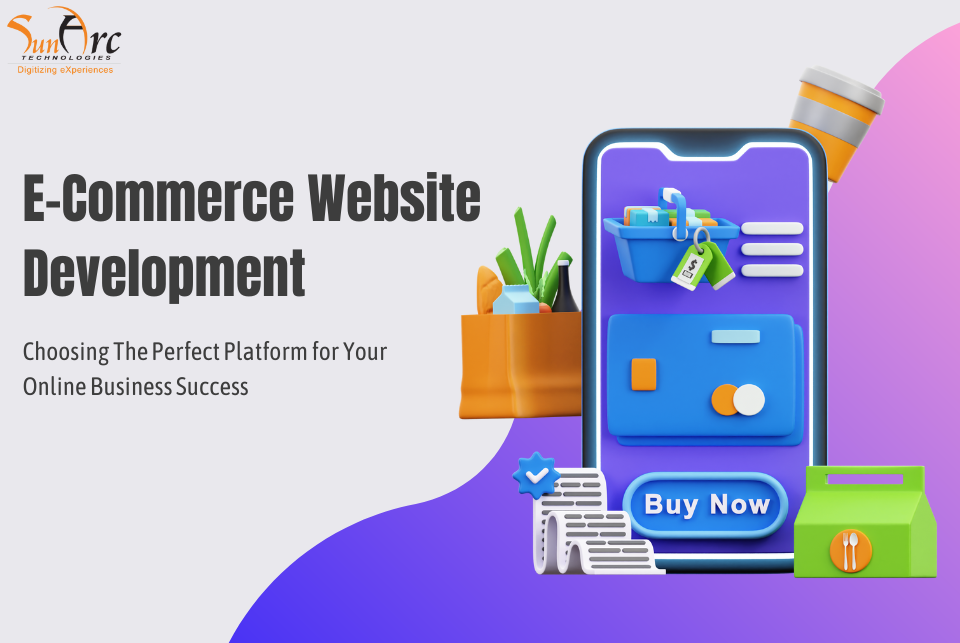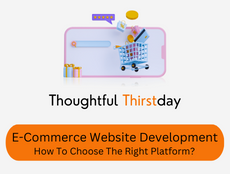Hey E-Commerce entrepreneurs! Are you currently struggling with the challenging task of selecting the best E-Commerce platform to drive your online business to new heights of success? Remember, you’re not alone. Choosing the right E-Commerce platform with the right E-Commerce development company is an incredibly important decision that can either lead to the success or failure of your digital venture.
Imagine a world where your E-Commerce platform effortlessly meets all your business requirements. It seamlessly handles transactions, expertly manages your inventory, and captivates customers with its user-friendly interface.
Yes, this all can be possible now.!!
Creating your dream E-Commerce store is not just a fairy tale; it can become a reality with the help of the right E-Commerce development company and platform.

In this blog post, we’ll dive into the different factors you should keep in mind when choosing an E-Commerce platform. Our aim is to offer you valuable insights that will assist you in making a well-informed decision. Now, let’s explore the world of E-Commerce website development and find the perfect platform for your business.
Definition and Role of E-Commerce Platforms
When it comes to E-Commerce Website Development, E-Commerce platforms are extremely important in determining how businesses appear online. An E-Commerce platform is a type of software that provides a content management system (CMS) that allows websites to efficiently handle various tasks, such as managing product catalogs, processing purchases, and maintaining a user’s interaction with an online retailer.
These E-Commerce platforms help entrepreneurs set up and run their online stores more effectively. They serve as the backbone of an E-Commerce website, offering a wide range of tools and features that make online transactions smooth and easy.
Here you can check out the list of the best E-Commerce platforms.
Common Features and Functionalities Offered by E-Commerce Platforms
Regarding Developing E-Commerce Websites or website development for E-Commerce, most of the E-Commerce platforms provide a diverse range of features specifically designed to improve the overall experience for both businesses and customers. Some common functionalities include:
1. Product Catalog Management
That can easily organize, categorize, and display goods with complete details, including photos, descriptions, and prices.
2. Shopping Cart
Customers can easily add things to their carts, examine those products, and then move on to the checkout process.
3. Payment Gateway Integration
An efficient payment gateway that helps to integrate safe payment methods, such as credit cards, digital wallets, or bank transfers, can ensure that transactions go smoothly and safely.
4. Order Management
Handle orders in an effective manner, monitor the status of those orders, manage inventories, and produce invoices or shipping labels.
5. Customer Management
Maintains customer profiles, keeps tabs on customers’ purchase histories, provides customers with personalized suggestions, and assists customers in their purchase journey.
6. Website Customization
Your E-Commerce platform should allow you to customize the appearance and feel of your website by providing you with various editable templates, themes, and branding choices.
Read also: Important Features That Online Shoppers Expect From Ecommerce Websites
Important Factors to Consider When Choosing an E-Commerce Platform For Maximum Profitability
1. Scalability and Flexibility
When it comes to E-Commerce Website Development and choosing the right E-Commerce platform, it is crucial to prioritize scalability and flexibility. It is important to ensure that your platform can support the expansion of your online business.
We suggest searching for platforms offered by well-known companies specializing in E-Commerce Website Development. These platforms should handle growing traffic, accommodate larger product catalogues, and seamlessly integrate new features.
In addition to being crucial, flexibility is also important when it comes to developing E-Commerce websites. It enables you to adapt and personalize your websites based on the ever-changing market trends and your customer’s preferences.
2. Cost and Budget Considerations
It is important to carefully consider your budget when embarking on developing a website for E-Commerce. You must assess the pricing models of various platforms, taking into consideration setup fees, transaction fees, monthly subscriptions, and costs associated with custom E-Commerce development or any extra features.
When searching for an E-Commerce platform, finding one that fits your budget and provides all the essential features to help your business succeed is crucial. Additionally, it’s important to consider the potential return on investment (ROI) that the platform can offer. You can discover a budget-friendly solution if you team up with a trustworthy E-Commerce development company.
3. Customization and Design Options
Customization is a crucial aspect of E-Commerce web development services. We recommend searching for platforms that offer a variety of customizable templates and design options. With this feature, you can effortlessly design a one-of-a-kind online store that perfectly reflects your brand’s identity and captivates your audience with its visually stunning appearance.
Look for platforms that give you the freedom to customize the layout, colours, typography, and other design elements. This will help you create a unique identity in the competitive world of E-Commerce.
4. Mobile Responsiveness and User Experience
As mobile devices become increasingly popular for online shopping, it is crucial to prioritize mobile responsiveness when developing E-Commerce websites. Make sure that the platform you select offers responsive design templates, which will ensure that users have a smooth and consistent experience no matter what device they are using.
When considering platforms, it’s important to give priority to those that prioritize mobile-friendly features. These features include touch-friendly interfaces, optimized checkout processes, and fast loading speeds. In order to attract and keep customers, it is crucial to ensure a user-friendly experience on all devices.
5. Payment and Shipping Integrations
For an E-Commerce website to thrive, it is crucial to have seamless payment and shipping integrations in place. When searching for platforms, it’s important to find ones that have smooth integration with well-known payment gateways such as PayPal, Stripe, or credit card processors. Implementing this lets you provide your customers with secure and convenient transactions.
This guarantees that your consumers’ financial dealings with you are safe and simple. The same is true for shipping, as seamless interfaces make precise delivery prices, real-time tracking, and quick order fulfilment possible. Think about E-Commerce platforms that have convenient payment and delivery options built-in or that can be quickly integrated.
6. Security and Data Protection
Security is a top priority in E-Commerce Website Development. Maintaining the privacy of both customers’ and company information is essential to gaining credibility.
Choose a platform that prioritizes security measures such as SSL encryption, PCI compliance, and fraud detection. Try to find updated security measures and stringent privacy policies. Working with a trusted E-Commerce development company will guarantee that your platform complies with standards and safeguards your customers’ personal data.
7. SEO and Marketing Capabilities
If you want to increase your website’s visibility and attract more organic traffic, it’s important to consider the SEO and marketing features offered by the E-Commerce platform you choose.
When searching for ways to improve your website’s visibility on search engines, be sure to explore features that can help you optimize page elements, URLs, and meta descriptions. You can greatly enhance their effectiveness by incorporating blogging, social media, and email marketing tools into your E-Commerce marketing strategies.
In addition, it’s crucial to have strong analytics and reporting features to keep track of how your website is performing, understand your customer’s behaviour, and evaluate the success of your marketing campaigns.
Read also: 15 Most Important E-Commerce KPIs To Track And Grow Sales Faster
8. Customer Support and Resources
Having reliable customer support is absolutely crucial when it comes to quickly solving any issues that may arise. When evaluating E-Commerce platforms, it’s important to consider their support level.
This includes considering factors such as their availability and response time through various channels like live chat, email, or phone. In addition, make sure to evaluate the platform’s resources, documentation, tutorials, and community forums. These resources are valuable for various purposes, such as troubleshooting, learning, and keeping up with platform updates and best practices.
FAQs (Frequently Asked Questions)
1. Which E-Commerce platform is the best for small businesses?
Shopify, WooCommerce, and BigCommerce are three of small enterprises’ most well-liked E-Commerce platforms. They cater to organizations of all sizes because of their flexible price structures, user-friendly interfaces, and scalability.
2. Can I switch E-Commerce platforms in the future?
Yes, it is possible to switch E-Commerce platforms during E-Commerce website development. Data migration, design transfer, and search engine optimization are just a few factors that may make this a challenging procedure. To cut down on platform migration costs, pick a platform that supports your long-term objectives.
3. Are open-source platforms better than hosted platforms?
There are benefits and drawbacks to using both open-source systems like Magento and WordPress and hosted platforms like Shopify and BigCommerce when creating an online store. Open-source platforms provide greater room for adaptation and personalization but are more difficult to set up and maintain. The hosting, upkeep, and security of hosted platforms make them ideal for new users.
4. Do I need coding knowledge to manage an E-Commerce website?
Not necessarily. While developing an E-Commerce website, you’ll find that many platforms offer user-friendly interfaces and convenient drag-and-drop functionality. These features allow you to manage your website without extensive coding knowledge. However, it is helpful to have a basic understanding of HTML and CSS if you want to personalize the design of your website.
5. Can I sell on multiple channels using an E-Commerce platform?
Yes, many E-Commerce platforms offer multi-channel selling capabilities during E-Commerce Website Development. You may sell your wares online or in person in shops, markets, or social media sites like Facebook and Instagram. These platforms include built-in integrations that make it easy to monitor stock and fulfill orders from any of your online stores with just one login.
Don’t Settle For Mediocre E-Commerce Development Services; choose Sunarc Technologies.
If you want your online store to thrive in the ever-changing world of E-Commerce Website Development, you need to pick the correct E-Commerce platform. Scalability, adaptability, pricing, customization, mobile responsiveness, payment and shipping integrations, security, search engine optimization, and customer support are just a few of the variables that should be considered when selecting the E-Commerce platform that will help you achieve your company goals.
Here at Sunarc Technologies, we are committed to becoming your go-to E-Commerce web development services provider. Our team of experienced specialists has extensive industry experience and is committed to providing personalized support to fit your specific needs.
We take great delight in developing E-Commerce websites that are both aesthetically pleasing and functionally robust. Our continuous dedication to quality guarantees that your E-Commerce site has all the features to succeed in today’s cutthroat online market.

